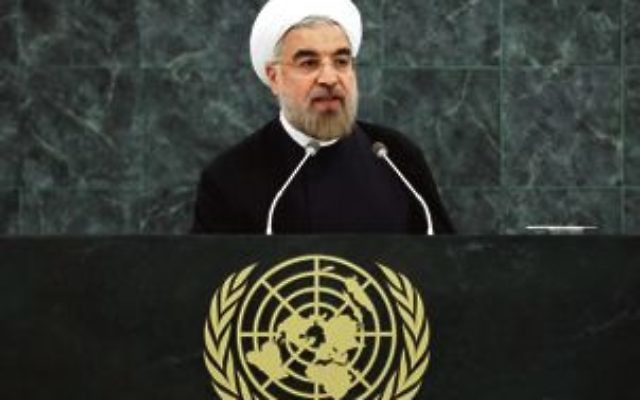Rouhani’s ‘charm offensive’
As the Iranian President Hassan Rouhani made his first appearance at the United Nations on Tuesday, Israel looked on with concern as it called his attempt a “charm offensive”.
Rouhani arrived in New York fresh from an interview with American television, during which he portrayed Iran as peaceful and claimed it has no interest in developing nuclear weapons. And his speech before the UN portrayed Iran in similarly peaceful terms.
“It is no coincidence that the speech lacked both any practical proposal to stop Iran’s military nuclear program and any commitment to fulfil UN Security Council decisions,” said Israeli Prime Minister Benjamin Netanyahu shortly after the speech. “This is exactly Iran’s strategy – to talk and play for time in order to advance its ability to achieve nuclear weapons. Rouhani knows this well.”
Israel’s delegation wasn’t present for the speech, following instructions from Netanyahu. A statement from his office said: “When Iran’s leaders stop denying the Holocaust of the Jewish people, and stop calling for the destruction of the Jewish State and recognise Israel’s right to exist, the Israeli delegation will attend their addresses at the General Assembly.”
Ahead of the Islamic Republic leader’s address, US President Barack Obama said that while he is encouraged by Rouhani, “conciliatory words will have to be matched by actions that are transparent and verifiable.”
This pleased Netanyahu, who said he appreciated the comment, and declared: “Iran thinks that soothing words and token actions will enable it to continue on its path to the bomb. Like North Korea before it, Iran will try to remove sanctions by offering cosmetic concessions, while preserving its ability to rapidly build a nuclear weapon at a time of its choosing.”
Netanyahu went on to say: “Israel would welcome a genuine diplomatic solution that truly dismantles Iran’s capacity to develop nuclear weapons. But we will not be fooled by half-measures that merely provide a smokescreen for Iran’s continual pursuit of nuclear weapons.”
Beyond the level of public statements, what were Israeli leaders and security officials feeling about Rouhani’s address? Concern about the positive terms in which he presented himself to normal Westerners, but also relief that he didn’t pull a rabbit out of a hat.
It wasn’t a speech that people can easily buy into – one that will lead to the average citizen of the US, Europe or Australia questioning his or her basic opinions about the Iranian threat – but rather one that appears to come from a parallel universe of strategic thought.
When the world is choosing between sanctions and military action against his state, Rouhani was on a crusade against the right to apply sanctions. “These sanctions are violent, pure and simple; whether called smart or otherwise, unilateral or multilateral,” he declared. “These sanctions violate inalienable human rights, inter alia, the right to peace, right to development, right to access to health and education, and above all, the right to life. Sanctions, beyond any and all rhetoric, cause belligerence, warmongering and human suffering.”
This parallel-universe thinking continued with the idyllic, utopian presentation of Iran as a bastion of level-headed thinking. “Iran seeks to resolve problems, not to create them,” he said. “There is no issue or dossier that cannot be resolved through reliance on hope and prudent moderation, mutual respect, and rejection of violence and extremism.”
This image of Iran is irreconcilable with the picture that most Westerners hold – nuclear threat or no nuclear threat. Israel is certainly troubled that Iran’s new President has enjoyed the podium of the UN – but can take comfort that he didn’t try a smarter strategy of giving full acknowledgment to exactly how Iran is perceived, and claiming that it’s making a 180-degree U-turn and is becoming fully trustworthy. This could have been a far harder strategy to dismiss.


comments